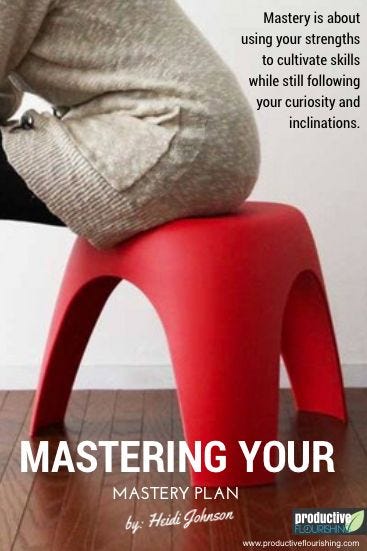Mastering Your Mastery Plan
At a foundational level you'll be less engaged if you aren't doing work you consider worth doing. Heidi Johnson's guest post explores recent research around workplace engagement and explains a proven framework to help you get more of it. Using the three l
Editor's note: This is a guest post by Heidi Johnson.
"The skill to mold the material into what we want must be learned and attentively cultivated." --Johann Wolfgang Von Goethe

A recent Gallup poll on the state of the global workplace shows that only 13% of workers feel engaged with their jobs, another 63% are "not engaged," and 24% are "actively disengaged," or deliberately working against their coworkers or place of employment. That's a lot of unhappy, not-flourishing folks. Which led me to wonder: What do we need in order to increase engagement with and flourishing in our work? My answer: we need a Mastery Plan.
The Three-Legged Stool
At a foundational level, you'll be less engaged if you aren't doing work that you consider worth doing. We crave it - after all, nobody wakes up and says, "Yippee! I'm going to work today to have my soul sucked dry!" At fridayprize, the concept of crafting work worth doing is grounded in a combination of three elements: mastery, values, and purpose.
When clients want to know how to reinvent their jobs from, say, a soul-sucking experience to one of flourishing, I explain that work worth doing is like a three-legged stool. Each leg represents a necessary element: mastery (of skills and strengths), values, or purpose. When all three work together, they support the seat of the stool - your definition of work worth doing. But if one leg breaks, that throws the whole stool off balance and everything starts to falter. That's when you see disengagement, poor performance, and lack of motivation.
There is a similarity between the elements used to craft work worth doing, flourishing, and motivation. Daniel Pink’s book Drive examined what truly motivates us and drew on years of research that finally pointed out that the old approach to motivation in work and business is all wrong. It turns out that external motivators are largely ineffective, and we perform better and reach goals faster when we have a say in how our work time is spent (autonomy), we’re able to learn and apply our skills (mastery), and we believe that the work we do is contributing to a greater good (purpose).
It stands to reason that when those elements are present, we also flourish and become much more engaged with our work. Many of the questions asked in the Gallup poll addressed employee growth and mastery, with a negative answer increasing the unhappiness quota. Mastery is a key element of both motivation and work worth doing, making it a likely part of improving work engagement.
The Mastery Plan
Back to that Mastery Plan - it requires engagement. Robert Greene's bestselling book Mastery details the three levels of mastery that you experience when you actively seek this way of working:
Level 1: Perhaps you're trying to decide what your calling or purposeful work is. Maybe you have basic knowledge of and limited skills in your vocation; this level is what Mr. Greene calls the Apprenticeship stage. You might be a new grad or re-entering the work arena; either way, engagement is just beginning to build in incremental steps.
Level 2: You're actively participating in your vocation and in work worth doing. Learning, skills, and knowledge are increasing on a daily basis through trial and error, experimenting and failing, and prototyping and succeeding. Through this Creative-Active stage, you are deepening your commitment to the work you know you must do. The engagement level kicks up a notch.
Level 3: You now have deep, intimate knowledge about specific aspects of your vocation. Nuances, patterns, and connections are experienced and seen at a level that others don't see. There is high engagement at the Mastery level as you seek the next stage of learning, which will most likely return you to Level 1. It is quite possible to be both a Master and an Apprentice at the same time.
[Editor's note: This framework closely overlays the similarly cyclical Small Business Life Cycle!]
Questions to Help You Formulate Your Mastery Plan
Regardless of where you think you might be in the three levels, I highly recommend using the following questions to formulate the foundation of your Mastery Plan. Even if you've been in your chosen vocation for years, have a small business, or find yourself ready for a serious transition into work worth doing, these questions can help you get oriented and start mapping out your actions.
Where do you want to be a year from now?
What do you need to learn to get there? (It's OK to ask someone.)
What skills do you need?
What skills do you already have that need fine-tuning?
Who has experience with what you want to learn?
Whom can you approach about becoming a mentor?
What's on your Recommended Reading List (or list of podcasts, videos, etc.)?
What conferences, workshops, intensives, or gatherings do you want to attend?
At its heart, mastery is about using your strengths to cultivate skills while following your curiosity and inclinations. (Click to tweet - thanks!)
Mastery feeds our bigger purpose, motivates us, and keeps us engaged.
In the comments, I would love to hear about where you want to be a year from now and what you are looking to master!


